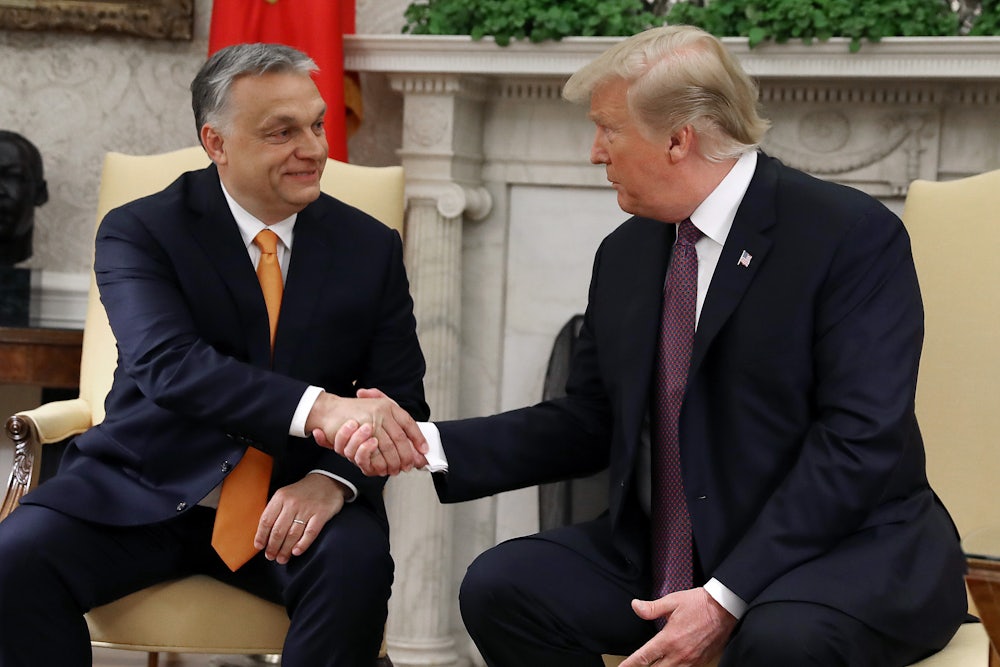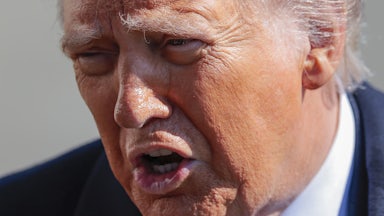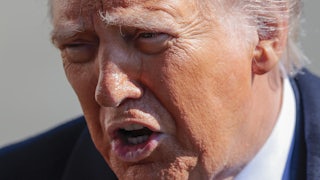The good news—yes, there’s a little—is that President Trump has not yet amassed nearly as much power as authoritarian leaders like Hungary’s Viktor Orbán, in part because America’s complicated political system has many roadblocks to forestall domination by one person. The bad news is that Trump is moving more aggressively and creatively than many autocrats abroad did, allowing him to accumulate more victories than many expected at the start of his term.
So the United States is not yet a dictatorship, but we will have to fight hard not to become one. That’s the general conclusion of McKenzie Carrier and Thomas Carothers, two scholars at the Carnegie Endowment for International Peace. And that’s the view of other democracy experts, as well—shock at how quickly and decisively Trump has dismantled long-standing limits on presidential power.
In a recent report, Carrier and Carothers did a detailed analysis comparing Trump’s administration to regimes in Brazil, Ecuador, El Salvador, Hungary, India, Poland, and Turkey that have taken power in recent years and eroded democratic norms. Orbán, Turkey’s Recep Tayyip Erdoğan, and former Brazilian President Jair Bolsonaro are the leaders abroad most often likened to Trump. And in all of these nations, democracy backsliding occurred largely because of executive overreach, as opposed to say, a military coup or civil war.
Trump, according to Carothers and Carrier, is employing three general tactics. He is personally dominating the executive branch of government much more than previous American presidents, firing basically anyone in any agency not aligned with him. Second, his presidential-controlled executive branch is then dominating other parts of government, ignoring and overriding court rulings, congressional appropriations, and states and cities’ decisions.
Third, the administration is using its power to curb the independence of U.S. civil society, for instance by forcing law firms and universities to abide by the administration’s edicts or face the loss of federal funding and security clearances.
Many leaders abroad have used similar tactics. But Carrier and Carothers argue there are some key differences—ones that make Trump worse than autocrats abroad. Many authoritarians abroad passed their antidemocratic agenda through their legislatures—or at least tried to. After all, as with Trump, these autocratic leaders are often democratically elected (so the public might back their agenda), and majorities in their country’s legislature are sometimes aligned with them. But the scholars say, “By contrast, the Trump administration has relied predominantly on executive orders, states of emergency, funding threats and cut-offs, and rhetorical tactics to achieve its executive aggrandizement ends, with little energy spent on legislative pathways.”
Another distinction is that Trump and his administration are moving faster than other autocratic regimes. “Steps comparable to the series of measures that Trump took in his early days to consolidate control over the executive workforce took form over a year-long period in Hungary,” the scholars argue.
One complication is that these scholars generally frame 2025 as the first year of the Trump administration. But in some ways, this is the fifth year, with Trump and his aides moving forward on some policies and initiatives first put into motion from 2017 to 2020.
But make no mistake: Overall, the Carnegie scholars depict the United States under Trump in dire terms.
“Relative to other backsliding cases, the Trump team has acted with uncommon early momentum in its efforts to consolidate power,” they write. “It has sustained its efforts simultaneously across multiple domains of American democracy, consolidating the process that many overreaching executives only achieve incrementally over a longer time. And the rapidity of Trump’s erosion of democratic norms has also been notable, even in comparison to other aggressive backsliding cases.”
Other scholars are making similar arguments. “The consolidation of Trump’s power has happened very quickly, more rapidly than we have seen in other examples of competitive authoritarian systems,” University of Michigan public policy professor and noted Substacker Don Moynihan wrote in a recent essay.
There is some good news (or at least less terrible news), according to Carothers and Carrier. First, many core elements of the U.S. system are still in place. Courts are ruling against Trump, and sometimes his administration actually abides by those decisions. There is still a robust free press covering Trump critically, even though the president and his allies are gaining more media power.
“The degree of democratic erosion in the United States is not yet as severe as that of most of its backsliding peers. Most of America’s democratic institutions and processes remain intact, protected by the Constitution and other U.S. laws,” the Carnegie scholars write.
Similarly, Moynihan described the U.S. as not fully authoritarian but in a state of “competitive authoritarianism”—the political science term for a nation in between full-blown democracy and full-blown autocracy.
Also, because Trump’s strategy has been to use excessive executive authority instead of getting Congress to formally change laws, his moves are reversible. For example, it’s horrible that the Trump administration often ignores court rulings and even worse that the Supreme Court is constantly rewriting legal precedent to support whatever Trump does. But the worst outcome would be if Congress signed legislation backed by Trump that formally ended judicial review, totally eliminating that path to pushing back against this president.
Finally, as Dartmouth College’s Brendan Nyhan said in a recent episode of TNR’s Right Now, the video series I host: “Trump is unusually unpopular for the leaders who have tried this playbook.” If (and that’s a big if) America has truly free and fair elections in 2026 and 2028, the authoritarian Republican Party seems likely to lose power.
For now though, Carrier and Carothers’s report confirms my concerns, and those of many millions of Americans. Too many other Americans, including many Democrats in Congress, are still too cavalier about what’s happening right now. They think that our checks and balances will save us, or that Trump is too incompetent, or that the public backlash and upcoming elections will stop him. But the real story is that it (dictatorship) is happening here. It’s already even worse here in some ways than in some autocratic countries abroad. We need to be alarmed and panicked, not to fall into despair, so that we can act aggressively before it’s too late.






